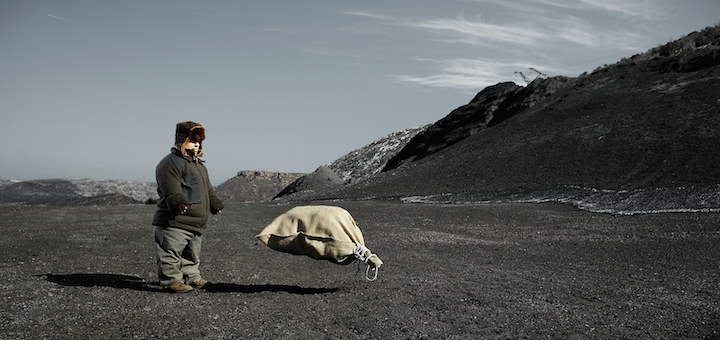
I have to concede, Sergio Caballero’s The Distance was not on my radar entering the Festival – only upon seeing this peculiar Spanish-Russian surrealist curio was selling quickly did I jump at the chance to catch it. Suffice to say, I’m glad I did – The Distance isn’t perfect, but it’s the sort of film us Festival faithful fill up our 20-30 film schedules each year in the hope of coming across it; that film so unique and absurd that we’ll find ourselves six months later recalling to others images and moments so outrageous and intriguing that we’ll end up questioning our own memories of it, and with the film having disappeared from any sort of distribution we’ll wonder if we ever really saw it all – in other words, the perfect Festival movie. Perhaps more than anything, this review is written record to future me, as if to say “yes, you did indeed see a bucket flirting in Japanese to a chimney”.
Already the film is tapping into that peculiar dreamlike state we often fall into when recalling some half-remembered cinematic image. There is a great line in Jim Jarmusch’s Limits of Control when Tilda Swinton recalls an image of an eagle flying through a room, dipping its wing in sand and she mentions offhand that she cannot remember whether she saw it in a film or a dream. This affected me greatly when I saw the film, as my mind conjured a vague image of exactly that that I couldn’t be certain where or if I had seen it. Turns out, it’s a (more famous than I thought) image in Andrei Tarkovsky’s Stalker, and this was a recollection that resonated with me, of the relationship between cinema and dreams, and the mysterious and powerful nature of the cinematic image when we process and store it.
I allowed myself that indulgent anecdote only because of a particularly relevant connection – The Distance has a strong connection with Stalker. In a profane reinterpretation of one of cinema’s sacred texts, we have a band of three people on a mission (dwarves in this case) on a mysterious journey through harsh, barren landscapes to find something supernatural in a rundown industrial building, while imparting a particular dreamlike absurdity, existentialism and strangely, telekinesis on its travellers. But more than the plot rehashing, it echoes Tarkovsky’s film visually – drab greys, harsh landscapes and slow takes – these sorts of homages always please film buffs, and mixed with a strong aesthetic influence from Beuys as well the film is astonishing to look at. Not just in its meditative, beautiful scenes but in its particular set of images and the strange impact these have on the viewer – at once so familiar because of the strong aesthetic influences the film wears on its sleeve, but at the same time so foreign and off-putting in how absurd they are. It’s a particular viewing experience in dream logic where a slab of meat with ‘Yoko Ono’ written on it makes sense watching the film, and then in hindsight appears so outrageous you question your own memory of even seeing it. In fact, through some sort of witchcraft I can never explain or even prove happened, for some reason I had the name Yoko Ono in my head a split second before it appeared on that ham, and so oddly anticipated that image. I still can’t quite explain it – in a meta manifestation of the film’s content Caballero might have a telepathic insight into my own brain, or my likely the film just had an uncanny ability to fundamentally question my own perception and memory as it; either way, it was a singular viewing experience.
So I recommend this film as I fell into its logic, though its by no means perfect. Its 80 minute runtime feels at once both insufficient (I’d sit through several more hours of it) and a stretch, as if you’re keeping score and haven’t been somehow seduced by the film’s peculiar atmosphere, narratively and thematically it runs out of gas half way, until the peculiar ending with a discovery that will likely be argued by audiences long after the credits roll. What one takes away from The Distance will depend on the viewer – is the artist-in-exile in Siberia a metaphor for an artist like Caballero languishing only, as I’ve mentioned, in the fleeting Festival circuit, or is it purely arbitrary absurdism – or another political point altogether? Critics seem to have dismissed this film, either outright or damned it with praise of its sheer idiosyncrasy and absurdity, rather than any serious defence. It’s a difficult film to review, and all I can take away from it is that it was quite a special experience, one of those films that comes along and reminds you how glorious this visual medium of cinema can be and its ability to suck you into a meditative reverie. Failing that, it’s a telepathic dwarf heist film and delivers upon that premise. Either way, a strong recommendation for that perfect Festival film – catch it before it disappears back into the aether from which it came.
Around the Staff:
| Jess Ellicott | |
| Ivan Cerecina |
